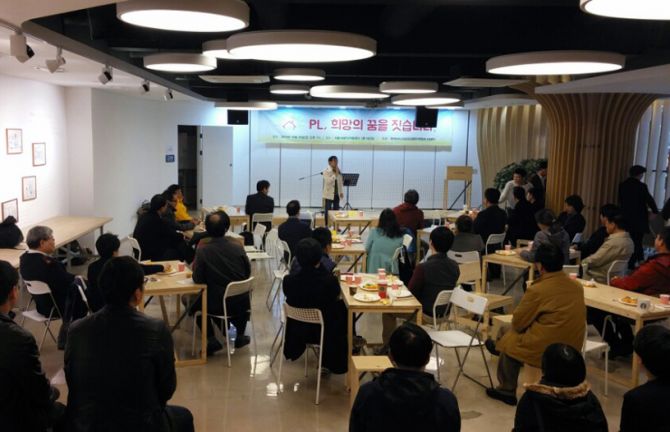


Feature Story
Republic of Korea’s network of people living with HIV opens its doors in Seoul
10 November 2015
10 November 2015 10 November 2015Munsu has been living with HIV for 20 years and has played an active role in the Republic of Korea’s AIDS movement. However, like thousands of people in his situation, he has not shared his HIV status with his family because he is fearful of their reaction and the social isolation that such a disclosure would most likely bring about.
He is all too aware of the stigma and discrimination faced by HIV-positive people in his country.
Munsu is a founding member of the Korean Network of People Living with HIV/AIDS (KNP+), a Seoul-based organization with some 2000 members, established in 2011 to bring five existing organizations under one umbrella and to provide a concerted and connected voice for the country’s HIV-positive community. On 30 October 2015, after several years of effort, KNP+ opened its first official office and community space.
An epidemic of fear
According to the Korea Centers for Disease Control and Prevention, there are more than 10 000 people living with HIV in the country. The Republic of Korea’s epidemic is heavily concentrated among gay men in urban settings, with men representing 92% of all HIV infections since data collection began in 1985.
Despite the country’s low HIV prevalence, fear of HIV is a problem. A national survey conducted in 2005 indicated that only half of respondents would care for a family member if he or she were HIV-positive. Reports also indicate that HIV phobia is present in health-care facilities.
At the KNP+ community centre event, Minji Kim, a young doctor and a volunteer with KNP+, shared the ignorance towards HIV she encountered in medical school. “One of our classes focused on AIDS and I was shocked at my classmates’ reactions,” said Minji. “They were making fun and mocking people living with HIV. I knew I had to do something to change this.”
Munsu thinks one of the reasons HIV is so feared in Korean society is that it is linked to homosexuality, transgender sexuality and other issues that are negatively viewed. This “double dose” of exclusion, he said, forces many people living with HIV to be isolated, especially from their family.
As the attachment to loved ones is particularly strong in Korean society, rejection by family members can mean that many people living with HIV are abandoned and segregated from social events. This situation extends to the provision of health care, he noted. “Many people living with HIV cannot be admitted to hospital because they have no family member to be responsible for them, to be their caregiver. This is essential in Korea if you want medical services,” said Munsu.
Overcoming stigma as a priority
As stigma in daily life is one of the top concerns most cited by members of KNP+, the organization and its partners are prioritizing efforts to respond. With its permanent office in place, KNP+ is preparing to compile Korea’s first People Living with HIV Stigma Index.
The Stigma Index initiative is a collaboration between the Global Network of People Living with HIV, the International Community of Women Living with HIV/AIDS and UNAIDS. The initiative aims to document HIV-related stigma and discrimination and provide a mechanism to compare experiences in different settings and across time. Findings will be used to advocate for change and progress to redress the situation. The Stigma Index is also important in that it empowers people living with HIV in the process, involving them directly in the design, deployment and analysis phases. This participatory approach is led by organizations of people living with HIV with support of international and domestic partners.
The Stigma Index will be carried out in 2016. A research team to oversee its development and deployment is expected to be operational in January 2016.
KNP+ is optimistic that the results of the Stigma Index will influence policies, particularly around human rights, improve psychosocial support programmes for people living with HIV and boost service uptake by making it easier for people to come forward. The organization also hopes to use the data collected to shape a national zero stigma campaign it plans to launch in 2017. Most importantly for the organization, the Stigma Index should kick start a long overdue dialogue on removing the deep-rooted fear of HIV in Korean society.
Steve Kraus, Director of the UNAIDS Regional Support Team for Asia and the Pacific, applauded the organization for taking the Stigma Index forward, stating that it is a key tool in bringing about change for people living with and affected by HIV.
“Our experience in all of the countries in our region that move forward in compiling the Stigma Index show that some remarkable things happen—a greater dialogue and understanding is established and a space for political mobilization is created,” said Mr Kraus. “It is in turn used for advocacy on budgets, on policies, on programmes and especially for reaching out to the community to make sure that no one is left behind and everybody feels included in the national response.”



